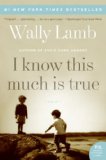the evidence of God exists in the roundness of things
posted at 2:24 am by brandon in there is fiction in the space betweenBecause the books, novels and otherwise, that I hold closest to my heart are so vastly different, and touch and engage my mind and imagination in such profoundly individual ways, I have always hesitated to single out any particular title as my absolute favorite. (I fight no such quandary when it comes to authors: given the incredible consistency of the quality of his work, juxtaposed against the radical shifts in both tone and topic that each of his books portrays, I have no qualms whatsoever about calling the brilliantly sophisticated Jay McInerney — he of the yuppie touchstones Bright Lights, Big City and Brightness Falls, and the underappreciated blues-drenched mid-’90s classic The Last of the Savages — my favorite author.)
But if you cornered and commanded me to name the best book I’ve ever read, I would be hard pressed to choose a more powerful tome than Wally Lamb’s shattering 1998 masterwork I Know This Much is True. A sprawling epic which leaps liberally across forty years and two continents in search of the heartbreaking truths which carried one twin toward outright madness and the other toward a cruel, endless cycle of self-destruction, True has just been reprinted in a stunningly gorgeous tenth anniversary commemorative edition that now, in an attempt to both trace the story’s origins and map the book’s evolving legacy, includes both a new interview with and a new essay from the author.
A novel that literally smashes into a hundred pieces every rule of contemporary commercial fiction with breathtakingly reckless ease — at nearly nine hundred pages, it’s nearly three times longer than your standard beach read; its protagonist, even at his most sympathetic and relatable, is a maddening, unlikable son of a bitch; the narrative whirls in and out of multiple protracted flashbacks that are so densely packed with pertinent information that you’ll need a flow chart to keep it all straight — True opens with a harrowing, indelible bang, as Thomas Birdsey, a deranged man claiming he’s following a direct order from God, walks into a public library and slices off his right hand with a butcher knife. As word spreads about the incident and we meet (and, against all odds, come to care deeply for) Thomas’ embattled twin brother, Domenick, the story flashes back to the summer of 1969 (whereupon we witness the birth of Thomas’ dementia) and later, at the book’s riveting midpoint, to the summer of 1949 (when, in a crazy, mind-bending master class in storytelling, Lamb expands the novel into a parallel narrative, as we get to read the “autobiography” of Domenick and Thomas’ maternal grandfather, and past and future begin working in magnificent concert, one ever aiming to haunt and inform the other).
Don’t allow yourself to be daunted by its intimidating heft, physical and otherwise; you’ll not find a wasted page — indeed, not even a wasted sentence — among this book’s nine hundred. There’s no concrete way to describe this novel — which contains no fewer than fifteen interconnected subplots masterfully woven together into one of the most compelling tapestries with which modern fiction has ever been gifted — except to say this: I know that True is a gripping, extraordinary, landmark achievement, one that I humbly suggest may never be bested. And I know that in ten years, no other piece of fiction has even come close.




